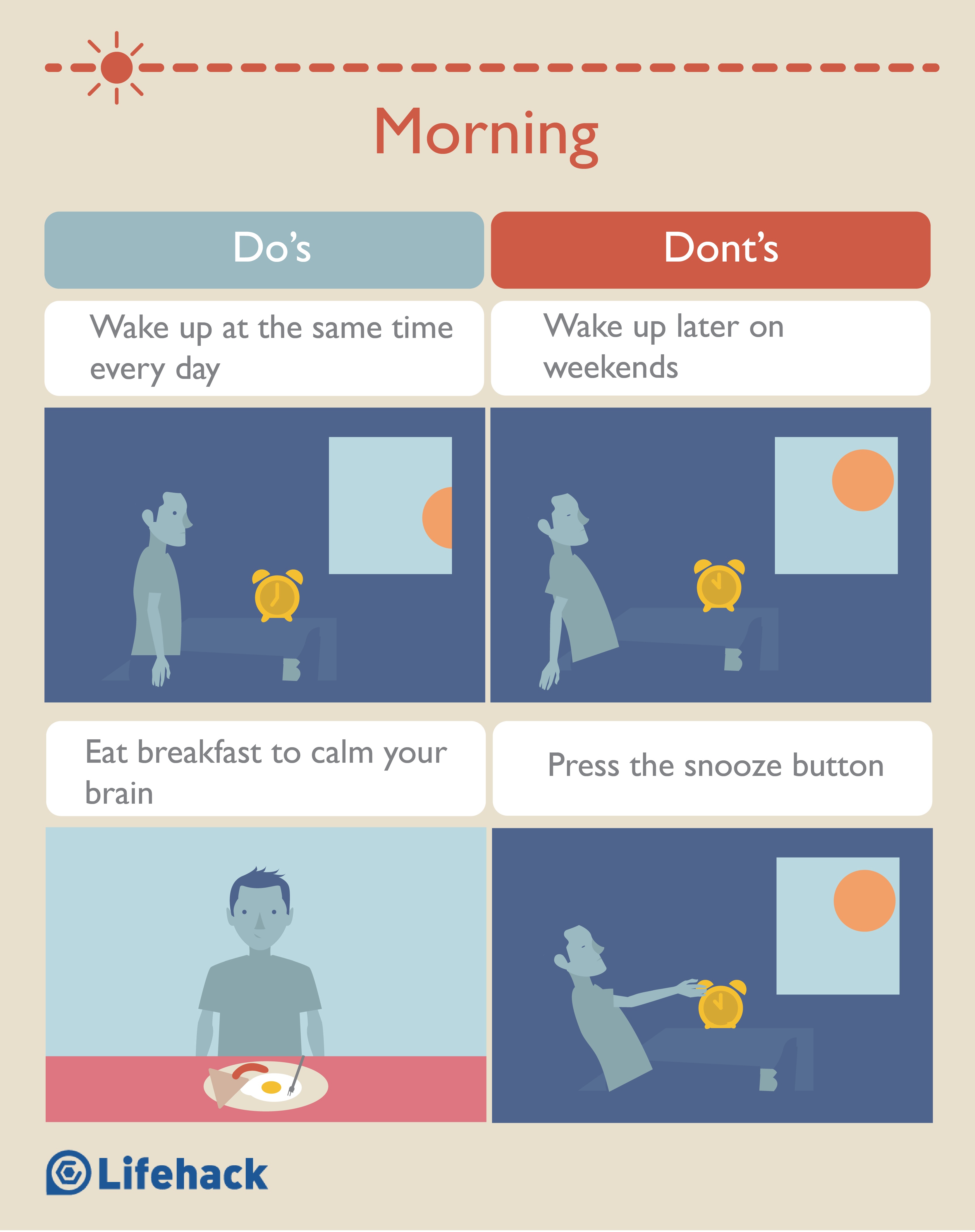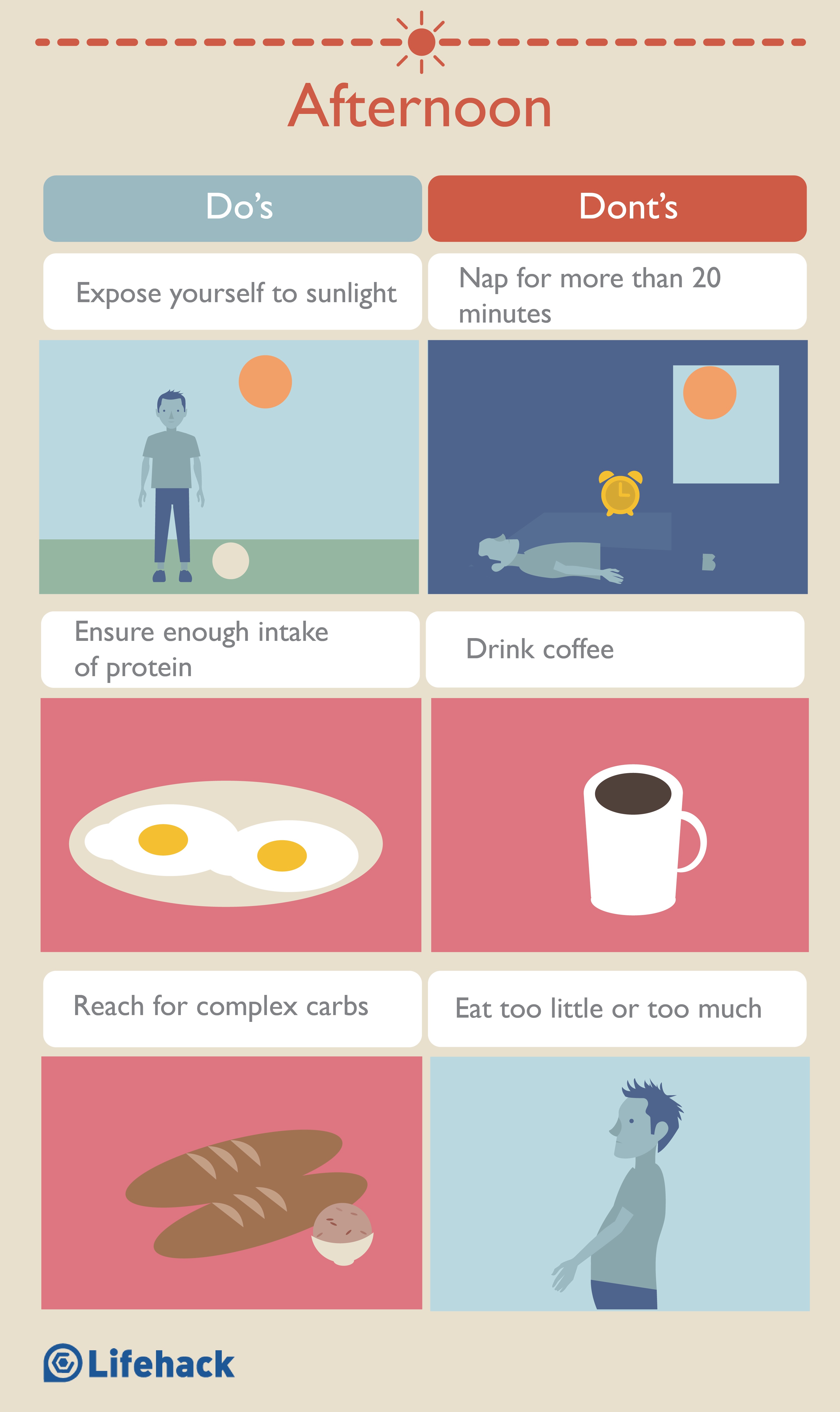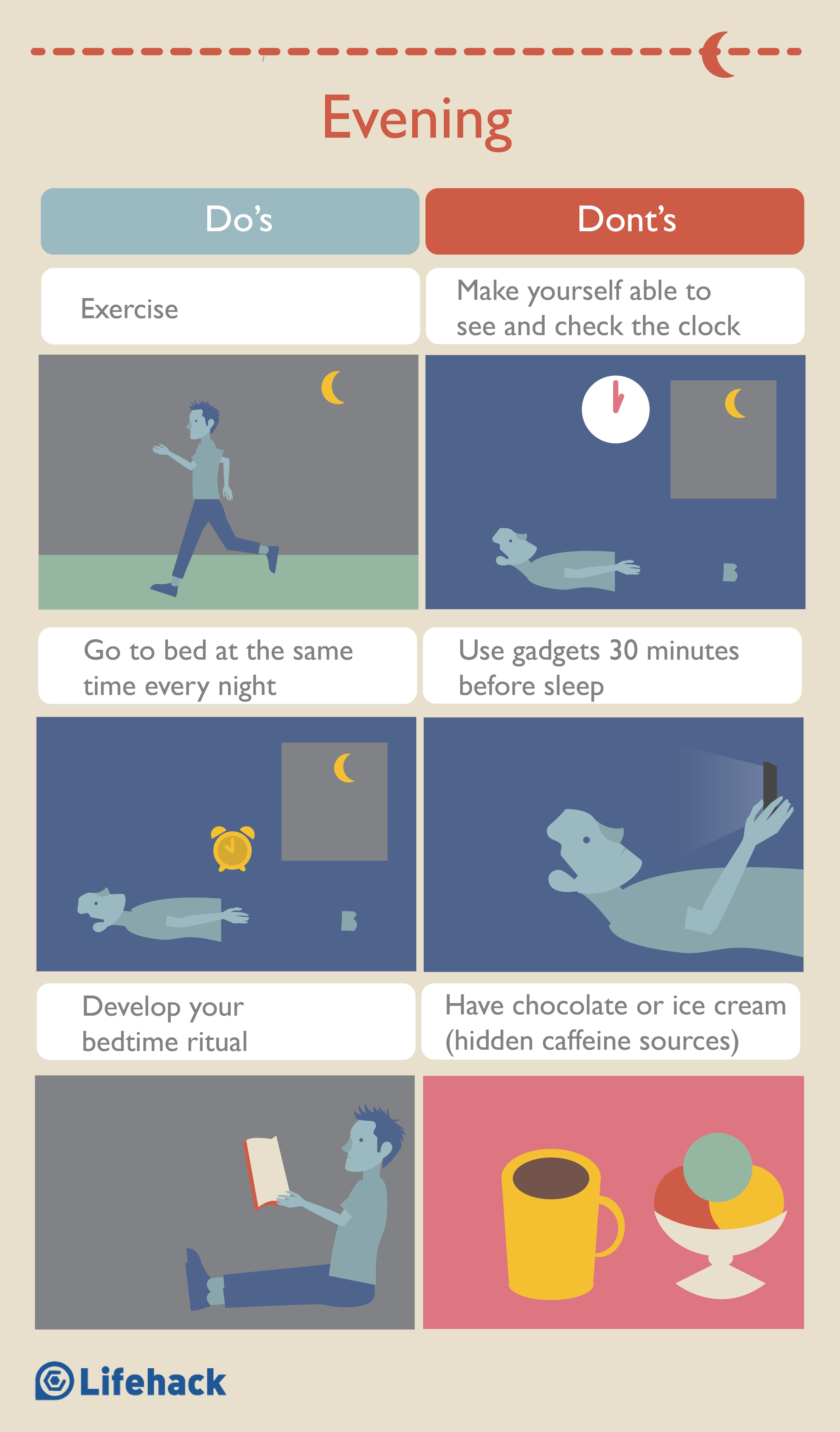When I was twenty-something, I didn’t really care much about my sleep quality because I could recover very quickly even if I had a bad night’s sleep. Since my first son was born, it became a totally different story. Partly because I’m older now, partly because I’ve had many more responsibilities. I could no longer work as productively as I could before if I didn’t sleep well the previous night.
Video Summary
To make sure I slept well at night, I started to pay attention to everything I did throughout the day. And unlike what most people advise, it’s not just a good bedtime routine that helps, it’s about everything we do – from the moment we wake up in the morning to going to bed at night.
Morning (7am – 12pm)
Wake up at the Same Time Every Day to Build Patterns
That means even weekends and days off. Why? Because our bodies are intelligently rhythmic and thrives on consistency. By waking up at the same time, we regulate the circadian rhythm that co-ordinates hormones and metabolism connected to sleep and wakefulness. Our bodies prepare to wake up around 1-2 hours before doing so, so making sure we wake up at a consistent time will be much easier and less stressful on these important rhythms.
Making sure you wake up (and actually get up) at the same time every day will help you get a better night’s sleep later on as you build a gradual, strong desire for sleep during your waking hours. Try consistently for 1 to 2 weeks to allow your body to create the perfect rhythm.
Eat Breakfast First Thing to Calm Your Brain
Fuelling yourself for the start of your day is common wisdom but did you know that it can also positively affect your sleep cycle? It’s all down to our evolution.
Dr. Nerina Ramlakhan believes eating first thing in the morning actually calms parts of the brain that are linked to our caveman behaviour of preserving energy and avoiding predators. In other words, by eating first thing, we’re reassuring the brain that there is a good supply of food causing it to remain in a relaxed state ready for sleep, which in our modern day case, is at the end of the day.
Step Away from the Snooze Button. It Confuses Your Brain
As mentioned above, our sleep patterns need to be consistent and nothing ruins that more than hitting the snooze button.
In fact, using an alarm altogether may be doing more harm than good. This is because our bodies start to reboot around an hour before we naturally need to wake up. It’s in this phase that adrenaline and cortisol is released allowing us to get into a gradual lighter sleep and prepare for waking. An alarm can jolt our bodies awake too early causing that groggy feeling we often get that takes ages to shake off.
The snooze button is an illusion. While we think we’re getting a few extra minutes of much-needed sleep, it’s really very bad quality sleep. If you do need to use an alarm, set it for the very last time you need to get up with no leeway for snoozing.
Afternoon (12pm – 6:00 pm)
Avoid Napping for More Than 20 Minutes. Otherwise You’ll Enter Deep Sleep
Napping can be a good way to recharge as long as it’s not for more than 20 minutes. This is because longer naps cause us to start entering a deep sleep which can be harder to wake up from. This is why we can sometimes rise from a nap feeling groggy. Set a timer for 20 minutes so you don’t go over. This way you’ll feel much more refreshed when you wake up.
If you do need to nap, try to avoid laying your head down later in the day. This is more likely to make it much more difficult to fall asleep at your usual bedtime and will disrupt your sleeping patterns.
Protein-Rich and Complex Carbohydrate Foods Make You Less Likely to Nap
Our diet has a massive effect on our sleep quality but we often don’t consider this when grabbing lunch or snacking throughout the day.
Protein-rich and complex carbohydrates foods (e.g. wholewheat pasta) take a longer time to be digested and make our blood sugar level increase gradually instead of suddenly compared to simple carbohydrates foods (e.g. cookies). This makes us less likely to become sleepy after lunch. Taking a nap which can easily affect our sleep cycle, making it harder to sleep at night.
Get Exposure to Natural Outside Light. It Synchronises Our Master Clock
The light we absorb during the day plays quite a big part in our sleep cycles. It synchronises what’s called our master clock which, amongst many things, allows our bodies to enter our sleep cycles efficiently. It’s part of the important circadian rhythm that regulates the body’s daily cycle.
Aim to get bright outdoor light exposure for 30-60 minutes a day especially around midday.
No Midday Coffee. It Takes Longer to Wear off Than You Thought
We might feel we need a pick-me-up half way through the day (although this won’t be necessary once your sleeping patterns are well established) and we can instantly reach for the coffee granules.
But reaching for that midday cup of coffee can create problems later on. Caffeine has a half-life of 3 to 5 hours meaning it takes this long for just 50% of the caffeine to wear off. The rest can still stay in our bodies for longer. You can see how drinking caffeine even in the middle of the day will cause havoc for sleeping later on. Save your coffee-drinking to mornings only.
Don’t Eat Too Little or Too Much. It Makes You Overeat/Undereat at Night
The amount of food we eat at mealtimes is also conducive to how well we sleep at night. Regulating our eating is crucial if we want a good night’s sleep. Eating too little during the day will more likely cause overeating in the evening close to bedtime. Our bodies don’t have enough time to digest the food meaning a night of tossing and turning.
Alternatively, if we eat too much for lunch, it’ll be hard to resist taking a nap, which can affect our desire for sleep at night.
Evening (6:00pm – 12:00am)
Do Exercise If You Want. It Doesn’t Affect Your Sleep
While exercise during the day can help towards feeling invigorated, we often think going for a run or anything rigorous in the evening will have us bouncing off the walls when it comes to getting to sleep. After all, our body temperatures and heart rates rise with exercise not to mention adrenaline.
However, this has actually found to have no effect on our ability to sleep even right before bedtime. Exercising at any time of the day will actually help induce sleep naturally so don’t be afraid to go for that evening run.
Go to Bed at the Same Time Each Night. You’ll Be More Successful
Like waking up at the same time, going to sleep at the same time makes for a more efficient sleep cycle. Scientists have even found students who go to bed at a consistent hour each night were more successful and healthy while those with irregular bed times less so.
Develop Your Own Bedtime Ritual as Your Brain Loves Consistency
Creating bedtime rituals will help your mind unwind and prepare itself for sleep. Reading and meditating are two great ways to calm the mind before hitting the pillow and in turn creates a perfect entrance into deep, good-quality sleep. Try to stick with these rituals as much as you can since your brain loves consistency.
Keep Your Alarm Clock out of Sight (but Within Reach) to Avoid Pressure
Lying in bed and checking the clock can be a massive sleep-killer. If we can’t sleep it can cause anxiety not to mention the artificial light beaming from the LED halting the natural melatonin production needed to send us off to dreamland. Try turning your alarm clock around or if you use your phone, keep it well away from your bed.
No Gadgets 30 Minutes Before Bed. The Blue Light Will Keep You Awake
The blue light from smartphones and tablets reek havoc on our brains when it comes to trying to fall asleep. They suppress melatonin and wakes our brain up because it’s busy absorbing information when we check emails or social media.
It’s important to, not only stop checking our phones around 30 minutes before we go to bed, but to also keep it out of reach. Late night texts, emails and messages can wake us up or our constant urge to check Facebook or Twitter in the middle of the night keeps our brains active so move it away.
Avoid Hidden Caffeine Sources Like Chocolate and Ice Cream
Avoiding caffeine before bed is an obvious one, but it might surprise you that a lot of foods secretly contain more of this stimulant than you think.
Chocolate, energy drinks, flavoured waters, ice cream and even some pain relievers contain enough caffeine to keep you awake. Make sure you check nutrition labels on the foods you eat around bedtime to make sure they don’t interfere with your shut eye.
















































